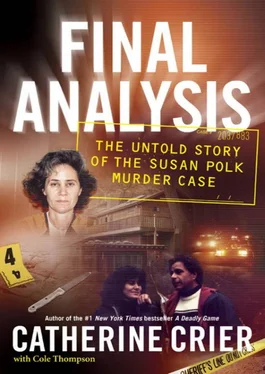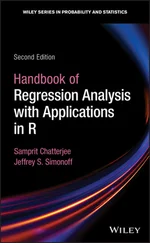Dr. Cooper was again defiant as he faced off with the prosecutor that morning, repeating his conviction that the murder charges against Susan Polk were “false.” He told jurors that an “injustice” was being carried out in Contra Costa County and he could no longer remain a neutral witness.
“You haven’t sat here and heard all the evidence,” Sequeira rebuked. “You don’t know if she’s being held on false charges.”
“I see that the autopsy evidence exonerates her.” Dr. Cooper reiterated that while the stab wounds Felix sustained were a “contributing factor,” he died as a result of a heart attack suffered during his “aggressive” and “angry” attack on Susan. “I believe it is sound logic to say if he weren’t involved in an altercation, he wouldn’t have died,” Cooper said.
Dr. Cooper contended that Susan’s account of the murder, as depicted in letters she sent him, was “honest” and an “excellent fit” with the autopsy report depicting Felix’s injuries. “My assessment is that she is a reliable eyewitness.”
“Are you aware that Susan believes she is a medium?” Sequeira asked, striding around the courtroom.
“My understanding is that she’s got considerable psychic ability and there’s no reason to doubt that,” Dr. Cooper replied matter-of-factly. “Maybe you don’t believe in psychic ability.”
“Really? So you believe she’s psychic?”
“I have no reason to doubt it.”
Though the questions seemed tangential to the witness’s expertise, Sequeira’s strategy was clear. Dr. Cooper’s strange conduct during his first appearance had already tainted his credibility, and now Sequeira was attempting to sully his scientific reputation further by showing his belief in psychics. It was a clever line of questioning as this placed the doctor in something of a catch-22. On one hand, Cooper could not disagree with Susan’s claims that she was a medium, since such a statement could make it seem as though other elements of her story were suspect. On the other hand, by saying that he believed in her abilities, Cooper inadvertently cast doubt on his own scientific credentials. The doctor emerged from the ordeal looking less and less like a man whose medical word could be trusted.
Sequeira next asked him about Susan’s assertion that her former attorney, Daniel Horowitz, had a role in his wife’s murder.
“I object!” Susan said with a grin. “I never exactly said that. Although, I do think that maybe it’s so.”
On redirect examination, Susan got down on the floor to reenact the events of October 13, 2002. As she lay prone on the courtroom floor demonstrating her position during the attack, she asked Dr. Cooper, “If I were able to kick him in the groin and disarm him, it would be consistent with the fact that I don’t have stab wounds?”
Yes, the pathologist affirmed.
Sequeira was dubious. Walking to the overhead projector, he flashed photos of Felix’s bloodied body and of the deep, swollen defensive wound on his right hand. He then contrasted the images with photos of Susan’s injuries; a red bruise encircling her right eye and supposed bite marks on her hands. “Somehow she got the knife away without sustaining one nick or cut on her whole body?”
“Yes,” Dr. Cooper replied.
Over two days of heated cross-examination, Cooper maintained that Susan’s lack of bruising did not trouble him, and in fact, was consistent with the crime scene.
“I object,” Susan said at one point during the question. “I did have injuries, they were relatively light compared to my husband. My crime is that I survived.”
“The odds were definitely against her,” Dr. Cooper added. “It’s unbelievable that a woman that size would attack a full-grown man—the chances of her survival are minuscule.”
“Yes, it’s, and I’m using your words, it is unbelievable, isn’t it?” Sequeira grinned.
“I would say miraculous. It’s not unbelievable, because it happened,” Dr. Cooper maintained.
Chapter Twenty-eight
SUSAN’S SOLILOQUY
On Wednesday, May 17, Susan called her most compelling witness to the stand.
“Mrs. Polk, your next witness?” Brady directed.
The gallery brimmed with journalists and trial watchers looking on in complete silence as Susan announced with a nervous giggle, “Yes, I’m going to testify, so the defense calls myself.”
Raising her right hand, Susan swore to tell the “whole truth.”
Over the prosecutor’s objections, Judge Brady ruled that Susan’s testimony would be a straight narrative; a Q & A with both questions and answers coming from Susan would be too confusing.
“This is not carte blanche,” the judge warned Susan before inviting jurors into the courtroom to begin hearing the testimony. “This is not an opportunity for a speech. This is a privilege, not a right. You may not like it, but the reality is now that the defendant—you—do not dictate how we proceed in this courtroom.”
“I object,” Susan said, telling Brady that it was her legal right as a pro per defendant to voice objections. “It may appear impertinent or argumentative or unruly to some members of the audience, but it’s not. This is not a playground. This is a battle for truth. This is not a movie. This is not a script.”
Jurors filed in that morning to find Susan outfitted in prison issue greens and seated in the witness box. “I’m not going to go into every detail,” she assured them. “Everyone wants to get on with their lives.”
Despite this disclaimer, Susan began her testimony with a two-hour slide show depicting her life. She narrated the show herself, with the help of on-again, off-again case assistant, Valerie Harris, on the overheard projector. Throughout the slide show, Susan’s demeanor seesawed between weepy and mournful to thoughtful and contemplative as she identified photos of herself as a young girl, as a twenty-five-year-old bride, and as wife and mother, posing with her husband, children, and the family dogs. She broke into sobs when an image of her son, Adam, popped up on the screen.
“I think he said what he said to survive, and that’s what he had to do,” Susan told jurors of the twenty-three-year-old who called her “evil” on the stand. “I think you saw a different Adam. The real Adam, the one I knew, sent me poems [in jail], came to see me, and was extraordinarily loving.”
Jurors were riveted by Susan’s narrative, which she delivered in a soft, folksy manner, her hands folded in her lap, along with a copy of her diary marked with yellow Post-Its. Throughout her testimony, she would refer to the diary that documented the actions of her husband and others who had come out against her.
As she spoke, Sequeira sat quietly in his seat, listening to her testify for much of the morning without voicing a single objection. Instead, he allowed Susan to talk about her relationship with Felix and her realization at the age of forty that she wanted out of the marriage. The twelve-member panel had already heard much of what Susan would testify to through other witnesses and in her opening statement. Still, she insisted the jury needed to hear “her story.”
Susan said the onset of Felix’s alleged abuse came soon after they were married, and she retold for jurors her story of premarital doubts about their relationship, saying that she later felt “ashamed” of her decision to marry “my therapist.” Despite her reservations and subsequent abuse, she never spoke up because she “thought telling someone would precipitate getting me killed…. I kept thinking I could fix it. His refrain was that nobody would ever believe me if I told them anything.”
Susan told jurors the first time she left Felix was in March 2001. He had a restraining order against her so she rented a room at the Claremont Hotel. She compared the experience to “recovering from an accident.” The peace and quiet was broken only by repeated calls from Felix. Susan held up a photo she took while at the hotel, showing the bruise she allegedly received on her wrist during an argument with him. Later that month, at her then-attorney’s request, Susan documented the alleged spousal abuse she suffered from October 2000 to March 2001 in an attempt to secure a restraining order against her husband. She recited the five incidents for the panel, contending that Felix had slapped, punched, and abused her, once tossing a drink in her face.
Читать дальше











